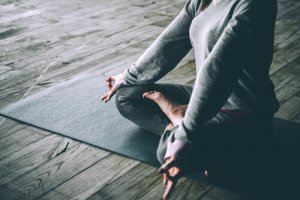Yoga And Depression: What Is Their Relationship?


Written and verified by psychologist and journalist Sara Clemente
The relationship between yoga and depression may be difficult to understand. One of the main symptoms of depression is apathy towards most activities. Practicing yoga offers multiple benefits to those who suffer from depression.
After depression is diagnosed, a combination of psychological and pharmacological treatment is usually established. However, its high prevalence plus the possible side effects of anti-depressants, have led to a boom in complementary therapies. This includes yoga.
What is depression?
Depression is a mood disorder that presents predominantly emotional symptoms. It is also characterized by the presence of other cognitive and somatic imbalances. Thus it is an imbalance that affects people both psychologically and physically. It particularly affects the emotional plane.

The symptoms of serious depression, depending on how they manifest, can include:
- Emotional: anhedonia, irritability, subjective feelings of unwellness, feelings of uselessness or blame, loss of interest in or pleasure from doing the majority of activities, and recurring thoughts of death.
- Cognitive: decrease in the ability to concentrate and make decisions.
- Somatic: weight loss or gain without dieting, insomnia or hypersomnia, psychomotor agitation or retardation, and fatigue or lack of energy.
Depression can vary. It depends on the intensity and the frequency with which the symptoms manifest. Their effects on the social, work or family life of someone with depression vary. It can also be temporary or permanent and can cause partial or total disability.
How does depression chemically affect the brain?
As we can see, a depressed person is affected in their whole body to some extent. It doesn’t just manifest in low self-esteem or chronic fatigue – it can lead to suicide.
This serious condition affects numerous kinds of neurotransmitters (molecules that help the neurons of the brain to communicate with each other):
- Norepinephrine: is a hormone that responds to stress, that is to say, it prepares the body to deal with a threatening situation. Constantly being in a state of fight weakens the immune system and increases the risk of suffering from cancer or disorders like depression and anxiety.
- Dopamine: a lack of dopamine is related to apathy, fatigue, mood swings and chronic boredom. It also reduces the sensations of reward and pleasure.
- Serotonin: a reduction in serotonin can lead to depression. It causes a lack of enthusiasm, loss of appetite and tiredness, as well as changes to body temperature and social behavior.
What does yoga provide?
Now that we know how depression works, we can appreciate the benefits of yoga in relation to this disorder. Practicing yoga is much more than just physical exercise. It also involves the mental and spiritual state. In fact, it comes from the term “yuj”, which in Sanscrit means yoke or union. It is harmony between body, mind and spirit. Are you starting to see the connection between yoga and depression?
Practicing yoga helps us to know ourselves better, both mentally and in the body. It enables us to explore the deepest corners of our being. All this through learning postures (asanas), breathing and mantras (sounds and words).
“My happiness is within me, not out there. Only I have the power at each moment”.
-Tantra Yoga-

People are multidimensional. We are not just symptoms or thoughts, but rather the fruit of their interactions. Yoga teaches us to harmonize our ideas, behaviors, states of mind, memory, and bodily systems. We can live in peace when these aspects of ourselves connect up. This organic balance is where yoga and depression meet.
The benefits of yoga for depression
Yoga originates from India. It stimulates the production of proteins which are the substances responsible for repairing neurons. This leads to an increase in neuroplasticity, which is the brain’s ability to create and change neuronal connections due to our experiences and learning.
Doing yoga also regulates our serotonin and dopamine levels, increases the flow of blood to the brain, and releases endorphins. All this contributes to improving our mood naturally.
The different asanas strengthen our musculoskeletal system. They increase the flexibility of our muscles and make them stronger. The ligaments, tendons, and fascias also build their strength.
Practicing yoga promotes a state of relaxation, which enables us to sleep better and more deeply
Practicing yoga improves emotional symptoms
The main symptoms of depression are related to emotions. The good news is that yoga can directly affect them. It reduces their intensity and offers immediate effects.
- It promotes a state of relaxation and tranquillity. Doing certain asanas causes a pleasurable sensation of well-being in the body. Yoga stimulates different parts of the body and contributes to improving the mood.
- Yoga fights stress and anxiety. Slow and deep breathing helps us to reach mental and emotional peace. Meditation and concentrating on different parts of the body enable us to reduce our levels of stress and anxiety. This also relieves inflammation and strengthens the immune system.
- It enables the connection with our inner world. Yoga enables us to change negative thoughts to positive ones. It helps to control the more difficult and complex emotions. Irritability was reduced, as well as feelings of despair and apathy.

Yoga has become an authentic holistic practice for fighting depression and other disorders. Thus, yoga and depression are related. Although yoga has many benefits it is best to be cautious. We should not attribute the improvement or cure of depression to just yoga. It cannot replace pharmacological or psychological treatments but it can support them.
The relationship between yoga and depression may be difficult to understand. One of the main symptoms of depression is apathy towards most activities. Practicing yoga offers multiple benefits to those who suffer from depression.
After depression is diagnosed, a combination of psychological and pharmacological treatment is usually established. However, its high prevalence plus the possible side effects of anti-depressants, have led to a boom in complementary therapies. This includes yoga.
What is depression?
Depression is a mood disorder that presents predominantly emotional symptoms. It is also characterized by the presence of other cognitive and somatic imbalances. Thus it is an imbalance that affects people both psychologically and physically. It particularly affects the emotional plane.

The symptoms of serious depression, depending on how they manifest, can include:
- Emotional: anhedonia, irritability, subjective feelings of unwellness, feelings of uselessness or blame, loss of interest in or pleasure from doing the majority of activities, and recurring thoughts of death.
- Cognitive: decrease in the ability to concentrate and make decisions.
- Somatic: weight loss or gain without dieting, insomnia or hypersomnia, psychomotor agitation or retardation, and fatigue or lack of energy.
Depression can vary. It depends on the intensity and the frequency with which the symptoms manifest. Their effects on the social, work or family life of someone with depression vary. It can also be temporary or permanent and can cause partial or total disability.
How does depression chemically affect the brain?
As we can see, a depressed person is affected in their whole body to some extent. It doesn’t just manifest in low self-esteem or chronic fatigue – it can lead to suicide.
This serious condition affects numerous kinds of neurotransmitters (molecules that help the neurons of the brain to communicate with each other):
- Norepinephrine: is a hormone that responds to stress, that is to say, it prepares the body to deal with a threatening situation. Constantly being in a state of fight weakens the immune system and increases the risk of suffering from cancer or disorders like depression and anxiety.
- Dopamine: a lack of dopamine is related to apathy, fatigue, mood swings and chronic boredom. It also reduces the sensations of reward and pleasure.
- Serotonin: a reduction in serotonin can lead to depression. It causes a lack of enthusiasm, loss of appetite and tiredness, as well as changes to body temperature and social behavior.
What does yoga provide?
Now that we know how depression works, we can appreciate the benefits of yoga in relation to this disorder. Practicing yoga is much more than just physical exercise. It also involves the mental and spiritual state. In fact, it comes from the term “yuj”, which in Sanscrit means yoke or union. It is harmony between body, mind and spirit. Are you starting to see the connection between yoga and depression?
Practicing yoga helps us to know ourselves better, both mentally and in the body. It enables us to explore the deepest corners of our being. All this through learning postures (asanas), breathing and mantras (sounds and words).
“My happiness is within me, not out there. Only I have the power at each moment”.
-Tantra Yoga-

People are multidimensional. We are not just symptoms or thoughts, but rather the fruit of their interactions. Yoga teaches us to harmonize our ideas, behaviors, states of mind, memory, and bodily systems. We can live in peace when these aspects of ourselves connect up. This organic balance is where yoga and depression meet.
The benefits of yoga for depression
Yoga originates from India. It stimulates the production of proteins which are the substances responsible for repairing neurons. This leads to an increase in neuroplasticity, which is the brain’s ability to create and change neuronal connections due to our experiences and learning.
Doing yoga also regulates our serotonin and dopamine levels, increases the flow of blood to the brain, and releases endorphins. All this contributes to improving our mood naturally.
The different asanas strengthen our musculoskeletal system. They increase the flexibility of our muscles and make them stronger. The ligaments, tendons, and fascias also build their strength.
Practicing yoga promotes a state of relaxation, which enables us to sleep better and more deeply
Practicing yoga improves emotional symptoms
The main symptoms of depression are related to emotions. The good news is that yoga can directly affect them. It reduces their intensity and offers immediate effects.
- It promotes a state of relaxation and tranquillity. Doing certain asanas causes a pleasurable sensation of well-being in the body. Yoga stimulates different parts of the body and contributes to improving the mood.
- Yoga fights stress and anxiety. Slow and deep breathing helps us to reach mental and emotional peace. Meditation and concentrating on different parts of the body enable us to reduce our levels of stress and anxiety. This also relieves inflammation and strengthens the immune system.
- It enables the connection with our inner world. Yoga enables us to change negative thoughts to positive ones. It helps to control the more difficult and complex emotions. Irritability was reduced, as well as feelings of despair and apathy.

Yoga has become an authentic holistic practice for fighting depression and other disorders. Thus, yoga and depression are related. Although yoga has many benefits it is best to be cautious. We should not attribute the improvement or cure of depression to just yoga. It cannot replace pharmacological or psychological treatments but it can support them.
This text is provided for informational purposes only and does not replace consultation with a professional. If in doubt, consult your specialist.







